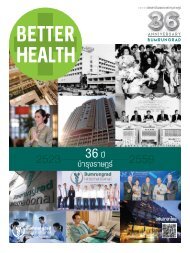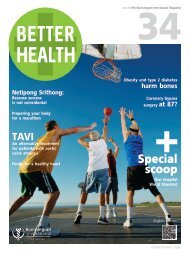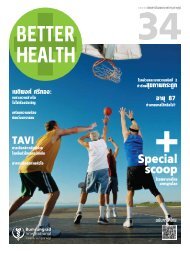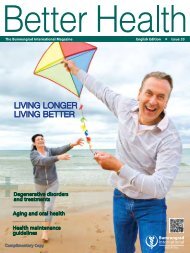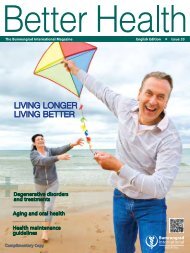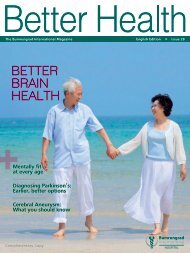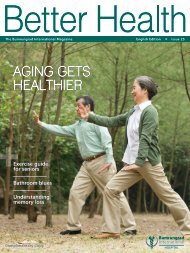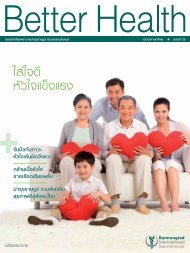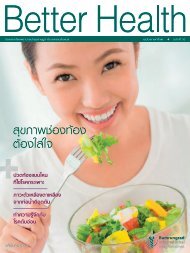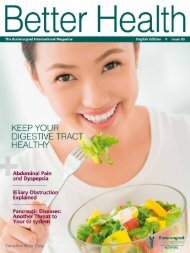All pdf BH Issue 33 Eng
You also want an ePaper? Increase the reach of your titles
YUMPU automatically turns print PDFs into web optimized ePapers that Google loves.
W e l c o m e<br />
Welcome to<br />
, the magazine<br />
for patients and friends of Bumrungrad<br />
International Hospital.<br />
It seems that most people want to live a long<br />
life, but how many are willing to make the extra<br />
effort in maintaining their physical health in<br />
order to ensure it? In this issue of Better Health,<br />
we focus on the health of seniors, with the aim<br />
to help elders, their families, and their friends<br />
prepare for “sunset years” of health and happiness.<br />
We begin with an article on page 4 about<br />
geriatric medicine, a specialty currently in high<br />
demand, and playing a major role in fast-aging<br />
societies in countries around the world, including<br />
Thailand. Following on page 8, we provide information<br />
about health problems of the elderly, along<br />
with recommendations for prevention and care.<br />
On page 12, a feature on geriatric dentistry,<br />
reminds us that elderly people often neglect<br />
their oral health, unaware that many geriatric<br />
problems start in the mouth. Followed by, an<br />
article about how skin changes as we age, along<br />
with care guidelines to protect and nurture<br />
lifelong healthy skin.<br />
We conclude with a report on four key practices<br />
to support geriatric health. Following these<br />
recommendations will help people of all ages<br />
prepare for and maintain lifelong health.<br />
As always, if you need advice or want to leave<br />
comments about our magazine, we encourage you<br />
to e-mail us at betterhealth@bumrungrad.com.<br />
We look forward to hearing from you and wish<br />
you health and happiness at every age.<br />
C o n t e n t s<br />
4 Geriatric medicine<br />
Living longer, living better<br />
8 Degenerative disorders<br />
Health problems of the older person<br />
12 Aging and oral health<br />
A healthy mouth leads to a healthy life<br />
14 Geriatric skin care<br />
Protect and prevent, for a lifetime of<br />
healthy skin<br />
16 M.D. Focus<br />
Get to know our doctors<br />
20 Health maintenance guidelines<br />
Good health is available for all ages<br />
22 Health Briefs<br />
24 Q & A<br />
26 News from Bumrungrad International<br />
Associate Professor Dr. Somsak Chaovisitsaree<br />
Medical Director and Contributing Editor<br />
8<br />
12 22<br />
Better Health magazine is published by Bumrungrad Hospital Public Company Limited and is produced<br />
for Bumrungrad Hospital Public Company Limited by Native Media Limited, 10/162 The Trendy Buiding,<br />
20fl., Room 2001C, Soi Sukhumvit 13 (Saengchan), Khlongtoey-nua, Wattana, Bangkok 10110.<br />
Tel: +66 (0) 2168 7624 Fax: +66 (0) 2168 7625. www.nativemedia.co.th<br />
No part of this magazine may be reproduced without the written permission of Bumrungrad Hospital<br />
Public Company Limited. 2015 by Bumrungrad Hospital Public Company Limited. <strong>All</strong> rights reserved.<br />
Publication of advertisements or sponsorships shall not constitute an endorsement by Bumrungrad<br />
Hospital Public Company Limited of the products or services promoted, of the company or organization,<br />
nor of the claims made.<br />
Telephone: 66 (0) 2667 1000<br />
Facsimile: 66 (0) 2667 2525<br />
Out-patient<br />
appointment: 66 (0) 2667 1555<br />
Website:<br />
www.bumrungrad.com
GERIATRIC MEDICINE<br />
Living longer, living better<br />
Living a long and happy life<br />
Long life is priceless. You are given the extra time to<br />
experience more that the world has to offer. Seems<br />
true enough, but only if you have one thing – your health.<br />
A long life, but with deteriorating health, leads to<br />
dependence on others – the antithesis of freedom and<br />
enjoyment.<br />
Can older persons expect to have a good quality of life<br />
longer into their later years? The answer awaits you in<br />
this edition of .<br />
Elders as the majority<br />
The proportion of older persons within the population<br />
is increasing rapidly. A 2014 survey by Thailand’s National<br />
Statistical Office found that 14.9 percent of the kingdom’s<br />
population is over 60 years of age, approximately 10 million<br />
people. The Institute of Population<br />
and Social Research, Mahidol<br />
University, predicts that these<br />
senior citizens will continue to<br />
live for an average of 20 years for<br />
men and 23.6 years for women.<br />
Dr. Lily Chaisompong, who<br />
specializes in geriatric medicine,<br />
analyzes this phenomenon.<br />
Thailand is shifting to a predominantly<br />
aging society, in step<br />
with global trends. “Ten years<br />
from now, it will be the first<br />
Dr. Lily Chaisompong<br />
Geriatric physician<br />
time in Thailand’s history that<br />
there will be more people aged<br />
60 years or older than minors,”<br />
Dr. Lily says. “And in about 25 years, there will be about<br />
20 million people over the age of 60, approximately onethird<br />
of Thailand’s population.”<br />
The increase is a result of advances in medical technology,<br />
efficient public health management, and a continually<br />
decreasing birth rate. “People over 80 years old today<br />
average at least four children per household to take care<br />
of them, whereas those just entering old age (60 years old),<br />
now only have two children per household to look after<br />
them.” Dr. Lily notes. “Today, families have fewer children,<br />
but people live for up to 20 to 30 years after retirement.<br />
The question is, how the older person can maintain a good<br />
quality of life, independently, for as long as possible?”<br />
To age well, start planning early<br />
Maintaining health into older age requires long term<br />
planning. “Start planning when you’re between 30 or 40<br />
years old,” Dr. Lily advises. “When you meet older people<br />
in good health, ask them what they did to stay fit. You’ll<br />
see their answers are quite similar: a diet of nutritional<br />
foods, regular exercise, and staying engaged in hobbies<br />
and interests to promote good mental health.”<br />
Dr. Lily makes clear these characteristics derive from<br />
good habits established in early adulthood. “It’s unlikely<br />
that people who start exercising at 60 or 70 will get the<br />
same benefits, or even enjoy them as much, as people who<br />
started much earlier,” she says. “The same goes for hobbies<br />
and activities: for those who put in the effort now to develop<br />
skills and expertise that help ward off depression and<br />
loneliness later in life. Starting late means less time to build<br />
this foundation and reap the benefits.”<br />
But it’s never too late to start! Today’s older persons<br />
must take charge of their health more so than in previous<br />
generations to prepare themselves for longer lives that<br />
they can enjoy.<br />
Geriatric medicine is the answer<br />
Geriatric medicine was developed to help older persons<br />
maintain a good quality of life as they age. With the current<br />
demographic trends mentioned above, this specialization<br />
becomes ever more critical to older persons and their<br />
families.<br />
There are distinct changes in older adults’ bodies that<br />
require care that is different from young and middle aged<br />
adults. “The elderly are not sick adults, but rather, they<br />
4
are a group that changes in every aspect – whether<br />
physically, mentally, or socially due to aging. Therefore,<br />
they need a special kind of care,” explains Dr. Lily.<br />
In order to deliver the best geriatric care to older<br />
people of various ages, we divide them into three groups:<br />
The youngest old (60 to 69 years) are<br />
those who have just entered older age,<br />
most of whom are still healthy, though<br />
some may have underlying diseases<br />
such as diabetes or elevated blood<br />
pressure. Care for them aims to assess<br />
and prevent the future risk of diseases<br />
such as osteoporosis, dementia, stroke,<br />
or heart disease.<br />
The middle old (70 to 85 years) is when the presence<br />
of chronic diseases starts to increase, while the ability<br />
to self-care starts to decrease. People in<br />
this range, generally, want to rely on<br />
themselves as much as possible. The<br />
goal of care is to maintain a good<br />
quality of life, paying particular<br />
attention to skeletal and muscular<br />
problems. Care includes reducing joint<br />
degeneration from arthritis and helping<br />
maintain mobility. There is also a focus on nutrition,<br />
especially if people have chewing or swallowing<br />
problems.<br />
The oldest old (86 years and older) is<br />
the time of increasing dependence on<br />
family or caregivers for daily living<br />
and self-care. Care for this group<br />
includes training the caregivers on<br />
nutrition and physical therapy. The<br />
geriatrician and team also serve as<br />
care coordinator between the patient<br />
and their relatives, other caregivers, and other<br />
physicians involved.<br />
the patients’ health and ability to take care of themselves.<br />
A fit 85 year old may be stronger and healthier than a frail<br />
75 year old.”<br />
Medical care for the elderly<br />
Whichever the age group, a significant characteristic of<br />
geriatric care is the coexistence of various diseases and<br />
conditions. Therefore, geriatric medicine requires a holistic<br />
approach to tackle these simultaneous health problems<br />
safely and efficiently.<br />
“To illustrate,” Dr. Lily says, “if an elderly patient has<br />
dizziness, the caregiver knows he or she must call a doctor<br />
but might not know in which field of medicine. Many things<br />
cause dizziness: vertigo, reduced blood flow to the brain,<br />
falling blood pressure, anemia or stress.”<br />
Duplicated medication is a frequent problem because<br />
elderly patients commonly have several doctors treating<br />
several diseases. This can lead to the patient receiving<br />
duplicate prescriptions. “But at Bumrungrad, we have a<br />
clinical pharmacist who reviews all the patient’s medications<br />
comprehensively to avoid duplicate treatments or drug<br />
interactions. Additionally, our pharmacists are aware that<br />
certain drugs are inappropriate for geriatric patients because<br />
of side effects like depression, confusion, or causing falls,”<br />
Dr. Lily says.<br />
Specialists in geriatric medicine work as a collaborative,<br />
interdisciplinary team, careful to ensure that they don’t<br />
prescribe treatments that conflict or duplicate. “Successful<br />
elderly medical care does not consist of individual doctors<br />
working separately, but rather, together as a team.”<br />
Dr. Lily says. “They assess all areas: general health, mental<br />
and emotional health, nutrition, and even the patient’s<br />
living environment, in reducing the risk of falls.”<br />
“At Bumrungrad we place the older person at the center<br />
of our geriatric program and care for them as if they were<br />
part of our own family.” Dr. Lily says. “With the determination<br />
to have good health, along with the assistance of our geriatric<br />
program, the elderly can live long, healthy lives.”<br />
“Age-oriented categorization is not always necessary,<br />
however,” Dr. Lily says. “In practice, doctors base care on<br />
5
6<br />
Getting to know Bumrungrad’s<br />
New Life Healthy Aging Clinic<br />
Good health and an active lifestyle enable a good quality<br />
of health in the later years. That’s why Bumrungrad<br />
Hospital created the New Life Healthy Aging Clinic.<br />
Its interdisciplinary team comprising of specialists in<br />
geriatric medicine, including doctors, dentists, nurses,<br />
pharmacists, nutritionists, and physical therapists<br />
delivers comprehensive holistic medical services to the<br />
older person.<br />
Services for elderly patients include general health care,<br />
preventive care, geriatric health consultation, and managing<br />
complicated health problems:<br />
Assessment of health conditions, focusing on syndromes<br />
such as dementia, depressive disorders, and osteoporosis<br />
Screening test for early onset dementia<br />
Screening test for depression<br />
Assessing risk for falls, as well as plans to reduce and<br />
prevent fall risks in the home<br />
Assessing risk and consultation on nutritional problems<br />
in the older person<br />
Assessing medication management, adverse drug<br />
reactions, and side effects appropriate for the older<br />
person<br />
Vaccination program for older persons<br />
Pre-operative assessment and post-operative care,<br />
appropriate for the older person<br />
Cooperation with different organizations to advise<br />
and assist the elderly in adjusting their domestic<br />
environments to make them safe and functional<br />
Consultation and assistance regarding living wills and<br />
palliative care.<br />
For more information, please call 0 2667 2000.
DEGENERATIVE DISORDERS<br />
Health problems of<br />
the older person<br />
Armed with proper knowledge about what health<br />
changes to expect in older age, along with proper<br />
prevention, care, and planning, older persons can<br />
live longer and healthier lives.<br />
As people age, tissues and organs deteriorate, causing<br />
inevitable health problems. Knowing what to expect<br />
and how to take action in preventing or minimizing<br />
problems leads to overall better health in the senior years.<br />
“We divide geriatric health problems into two major<br />
groups,” says Dr. Lily Chaisompong, who specializes in<br />
geriatric medicine at the New Life Healthy Aging Clinic.<br />
“The first comprises common diseases that may be found<br />
at the younger ages such as diabetes, high blood pressure,<br />
heart disease, and kidney diseases, but that can become<br />
more serious and complicated with age. The second group<br />
comprises age-related geriatric syndromes, which can<br />
decrease a senior’s self-care ability.<br />
Geriatric syndromes:<br />
1. Confusion and amnesia<br />
Memory loss and slower thinking<br />
come with age. However, acute<br />
health problems such as infections,<br />
heart, or brain conditions can<br />
trigger mental disorientation and<br />
confusion. Finding and treating<br />
the underlying illnesses usually<br />
brings the changes back to normal.<br />
However, a more gradual and<br />
insidious change in an older person’s<br />
mood, behavior, or memory may signal the onset of dementia.<br />
The warning signs of dementia include difficulty learning<br />
or remembering new things, repeating words or questions,<br />
the inability to perform complicated tasks, getting lost or<br />
forgetting familiar places, no interest in socializing, speaking<br />
less, and a change of habits.<br />
Alzheimer’s disease is the most common cause of<br />
dementia, but others include stroke, Parkinson’s disease,<br />
hypothyroidism, and vitamin B12 deficiency.<br />
Prevention and care<br />
Consult with a doctor if the patient exhibits changes in<br />
thinking and memory that impact daily life. Dementia is<br />
incurable, but brain-stimulating activities such as doing<br />
light household chores, socializing with friends and family,<br />
reading, playing mental games such as crossword puzzles,<br />
and physical exercise can help to slow its progression.<br />
2. Osteoporosis<br />
Osteoporosis, a silent and insidious<br />
disease that causes loss of bone<br />
mass and makes bones brittle,<br />
shows no early symptoms. Patients<br />
generally only become aware of<br />
it if they happen to fall and suffer<br />
bone fractures. Postmenopausal<br />
women and men of over 70 years<br />
of age are particularly at risk.<br />
Prevention and care<br />
Women over 55 and men over 70 should get tested<br />
for bone mineral density (BMD), which indicates the<br />
density of bone mass in comparison to its normal ratio<br />
in younger adults.<br />
Vitamin D helps the body absorb calcium. Get tested for<br />
a deficiency, and if found, take vitamin D supplements.<br />
Ingest foods high in calcium or supplements of 1,000<br />
milligrams per day.<br />
Practice weight-bearing exercises such as walking, running,<br />
or lifting light weights.<br />
8
If diagnosed with osteoporosis, get treatment to reduce<br />
the risk of bone fractures.<br />
3. Equilibrium (balance) problems<br />
and accidental falls<br />
Balance problems that lead to<br />
falls have several causes. These<br />
include joint degeneration, muscular<br />
atrophy or weakness, brain<br />
diseases, a decrease in blood<br />
pressure when getting up from a<br />
sitting or lying position, cardiac<br />
arrhythmias, medications affecting<br />
blood pressure or causing drowsiness,<br />
living environments with insufficient light,<br />
hazardous furniture, or sloping, slippery, or wet areas.<br />
Balance problems or accidental falls are especially<br />
dangerous for older patients with osteoporosis. Falls can<br />
easily cause bone fractures which can lead to a multitude<br />
of problems and complications such as the need for surgery<br />
and prolonged hospital stays.<br />
Prevention and care<br />
Avoid medications that cause drowsiness or low blood<br />
pressure.<br />
Do exercises that focus on muscular strength and balance.<br />
Improve the safety of the living environment, such as<br />
by installing sufficient lighting, non-slip flooring, and<br />
handrails.<br />
Have a bone density test for osteoporosis and receive<br />
treatment as necessary.<br />
4. Insomnia<br />
Sleep problems are very common<br />
as we age, due to worsening quality<br />
of sleep. These may include<br />
difficulty falling asleep, frequent<br />
waking, unrestful sleep, and feeling<br />
unrefreshed in the morning.<br />
Causes of poor sleep quality include<br />
aging physiology, depression, stress,<br />
anxiety, chronic pain, acid reflux,<br />
respiratory problems, snoring, frequent urination, and the<br />
side effects of medications.<br />
Insomnia increases the probability of falls, depression,<br />
and an impaired immune system, which can lead to other<br />
health problems.<br />
Prevention and care<br />
Design the bedroom to promote better sleep, for example,<br />
use curtains and bedclothes with calm and solid colors<br />
(not too hot or too cold).<br />
Try to sleep in the same place and at the same time<br />
every night to regulate the body clock.<br />
Don’t go to sleep too early. The best hours to go to bed<br />
are from 21.00 to 22.00, and to wake up are from<br />
4.00 to 5.00.<br />
Drink water first thing in the morning and throughout<br />
the day. Reduce water intake after dinner to decrease<br />
night time urination; avoid caffeinated drinks after 14.00.<br />
Don’t take long afternoon naps. Instead, do a stimulating<br />
activity such as chatting with friends. If you have fatigue<br />
or drowsiness, take a short nap no later than 15.00.<br />
Ask your doctor to review any medications that may<br />
cause insomnia, or any other factors that may lead to<br />
insomnia as well.<br />
Use sleeping pills only under a doctor’s supervision.<br />
Prolonged use can cause dependence.<br />
5. Urinary and fecal incontinence<br />
Urinary or fecal incontinence results<br />
from many factors such as pelvic<br />
muscular weakness or atonicity,<br />
overactive bladder, brain and<br />
nerve related continence control<br />
problems, certain types of medications,<br />
infection, constipation,<br />
prostatic enlargement, and<br />
diabetes.<br />
Prevention and care<br />
Consult a doctor to find correctable causes such as<br />
bladder infection.<br />
Do exercises and movements to strengthen muscles such<br />
as clenching the pelvic floor muscle 50 to 100 times<br />
a day.<br />
Urinate when the urge comes, but if practical, try to<br />
extend the time between bathroom visits to train the<br />
bladder to hold more urine.<br />
10
Have your doctor review your medications and point<br />
out those that may suppress appetite.<br />
Consult a doctor or nutritionist for recommendations on<br />
nutritional supplements and appropriate diet.<br />
8. Hearing problems<br />
Hearing loss problems are common in older people. Hearing<br />
loss warning signs are the inability to perceive high-pitched<br />
tones or high-frequency sounds such as a<br />
female voice or high-key music, and the<br />
inability to understand conversations<br />
in noisy venues. Bad hearing<br />
degrades the quality of life because<br />
it limits social interaction and<br />
denies simple pleasures like<br />
listening to music or watching TV.<br />
6. Dizziness and vertigo<br />
Older persons are prone to<br />
dizziness and vertigo, which<br />
frequently lead to falls. Causes<br />
include low blood pressure or<br />
the side effects of medication<br />
(painkillers, tranquilizers, or<br />
anticonvulsants), vertigo, cardiac<br />
arrhythmias, anemia, and anxiety.<br />
Prevention and care<br />
Determine the cause and change the behavior.<br />
Move carefully, particularly when standing up from<br />
sitting or lying positions.<br />
Use canes, crutches, walkers, or handrails to assist<br />
with balance.<br />
7. Malnutrition and eating disorders<br />
There are many causes to eating disorders and the<br />
insufficient intake of food that leads to malnutrition. They<br />
include dental problems, problems with<br />
swallowing, decreased appetite,<br />
weight loss, diseases and the side<br />
effects of medications that suppress<br />
appetite, depression or dementia,<br />
and various chronic diseases.<br />
Malnutrition in older persons<br />
exacerbates infections and causes<br />
osteoporosis, muscle atrophy, and<br />
lethargy.<br />
Prevention and care<br />
In case of severe hearing loss, where the patient is barely<br />
able to perceive sound (especially in both ears) and<br />
becomes unable to communicate with others, hearing<br />
aids might alleviate the problem.<br />
Family, friends, and caregivers should speak closely and<br />
slowly, in low tones, and maintain eye contact when<br />
talking to older persons. Make sure that they can see<br />
the speaker’s lips and choose venues that do not have<br />
loud background noise.<br />
9. Vision problems<br />
Diseases such as cataracts, glaucoma,<br />
and macular degeneration can harm<br />
an older person’s vision, impacting<br />
their quality of life.<br />
Prevention and care<br />
Older persons should have annual<br />
eye exams to check for problems<br />
before they arise and become untreatable<br />
and irreversible. Finding disorders<br />
in the early stages results in a better chance for successful<br />
treatment.<br />
Don’t neglect emotional care. “With so many physical<br />
issues involved in elderly care, it’s easy to neglect mental<br />
health problems, which are just as equally important,”<br />
Dr. Lily says. “Older persons should strive to maintain<br />
an active and curious mind and try to avoid emotional<br />
stressors. Family members, friends, and caregivers play a<br />
key role in helping elders live happily. Treating them with<br />
gentleness, compassion, and genuine interest are at the<br />
heart of effective care.”<br />
Prevention and care<br />
Consult a doctor to find and treat any possible causes.<br />
Have a regular dental check-up, at least once a year.<br />
Dining with family or friends can improve the appetite<br />
and nutrition.<br />
Prepare food in easy to eat and digest portions.<br />
11
AGING & ORAL HEALTH<br />
A healthy mouth leads to<br />
a healthy life<br />
Maintaining excellent oral health supports your overall<br />
health and life quality much more than you might expect.<br />
Thus, geriatric dentistry is a key component of<br />
Bumrungrad’s multidisciplinary team that provides holistic<br />
health care to elders. Our geriatric dental professionals<br />
provide care for seniors with a variety of oral health<br />
programs, whether simply for maintenance or for more<br />
serious conditions.<br />
talks with Dr. Matana Kettratad D.D.S., who<br />
is specially trained in geriatric dentistry. Her practice focuses<br />
on age-related oral diseases and<br />
preventative oral health care.<br />
Dr. Matana Kettratad<br />
Geriatric dentist<br />
Older mouths require<br />
concerted care<br />
Common oral health problems<br />
in seniors include dental caries<br />
(tooth decay), dental attrition,<br />
gingival recession; problems with<br />
implants and false teeth (looseness<br />
or friction), xerostomia, angular<br />
cheilitis, and periodontitis (also<br />
known as pyorrhea), which<br />
typically accompanies diabetes.<br />
Elders with health problems need<br />
special mouth care, especially<br />
those with multiple chronic diseases who take multiple<br />
medications; and cancer patients undergoing radiation<br />
therapy around the head or throat, which affects the salivary<br />
glands, which increases the risk for caries and mouth ulcers.<br />
“If elders don’t address these problems, they may have<br />
difficulty eating and may have a decreased appetite. This<br />
can eventually lead to malnutrition,” Dr. Matana says.<br />
“Patients at risk for respiratory infections also need to avoid<br />
oral infections because germs in the mouth can infect<br />
the lungs.”<br />
Simple ways to a healthy smile<br />
People’s mouths change as they age, which means they<br />
must adapt to changes in their oral healthcare. For example,<br />
older people’s sense of taste changes. Aging mouths produce<br />
a thinner oral soft tissue. When accompanied with dry<br />
mouth as a side effect of multiple medications, some elders<br />
may easily develop ulcers, a burning sensation, or become<br />
sensitive to spicy foods. These signs indicate that their<br />
current method of oral care is no longer sufficient.<br />
Dr. Matana suggests that seniors:<br />
Use fluoride toothpaste and have it in contact with teeth<br />
for at least two minutes during brushing.<br />
Floss or use interproximal brushes daily. Dental floss<br />
and brush size depend on the size of gaps between teeth.<br />
Those with xerostomia or insufficient saliva can stimulate<br />
saliva glands by eating foods with fiber and frequently<br />
sipping water. The doctor may suggest using artificial<br />
saliva for more severe cases.<br />
Eat foods high in fiber to stimulate chewing, which helps<br />
to scrape and clean the teeth.<br />
Avoid sugary foods, which can cause dental caries.<br />
See a dentist regularly.<br />
“Oral health and overall health are inextricably related,”<br />
Dr. Matana emphasizes. “But while elderly people need<br />
special attention, younger people should also take good<br />
care of their teeth and gums to minimize problems as they<br />
age. Good oral health affects the quality of life, regardless<br />
of how old you are!”<br />
12
GERIATRIC SKIN CARE<br />
Protect and prevent,<br />
for a lifetime of healthy skin<br />
Changes in the skin are possibly the most visible signs of aging. However,<br />
age is not the only factor that impacts skin health, explains Dr. Nussra<br />
Wongrattanapasson, dermatologist and aesthetics expert to .<br />
Change of age, change of skin<br />
Like any organ, skin changes with age. “Adolescent skin is rather oily,”<br />
Dr. Nussra notes. “In middle-age, the skin’s elasticity and strength deteriorates,<br />
resulting in bigger pores and wrinkles. In life’s later years, along with wrinkles,<br />
the skin gets dry, saggy, and loose with deep nasolabial folds and tear-trough<br />
deformity.”<br />
Dr. Nussra points out that skin changes differ for each person depending<br />
on concomitant factors such as genetics and lifestyle. But the greatest threat<br />
to healthy skin, she notes, is regular and prolonged<br />
sun exposure without sunscreen protection.<br />
Skin problems in the elderly<br />
Certain well-established beauty treatments and<br />
avoiding sun exposure can slow a range of cosmetic<br />
skin problems as we age. But there are also more<br />
serious skin diseases and conditions that commonly<br />
afflict elderly people.<br />
Melanoma and other skin cancers: Warning signs<br />
include unusual spots, lumps, chronic wounds, and<br />
moles that change in size and color, accompanied<br />
by pain and bleeding. If you exhibit any of these<br />
symptoms, have a doctor examine your skin<br />
immediately.<br />
Dry skin and allergic rashes: Deterioration of<br />
Dr. Nussra Wongrattanapasson<br />
Dermatologist<br />
sweat glands and sebaceous glands can cause flaking and highly sensitive<br />
skin. Severe cases can warrant the doctor prescribing topical drugs. To<br />
maintain the improved skin condition after this treatment, the doctor<br />
might also recommend specially formulated lotions.<br />
Hair loss and irritated scalp: Usually caused by dry scalp and hair dyeing.<br />
Seborrheic Keratosis, ephelides, and brown spots: Laser treatment effectively<br />
removes these growths.<br />
“Less common symptoms such as red spots, for example, might indicate<br />
liver disease,” Dr. Nussra says. “Elderly people and their caregivers should<br />
recognize and not ignore any skin symptoms because they could be signs of<br />
possible serious underlying diseases.”<br />
Skin care can start right now!<br />
It’s never too late to start taking care of your skin:<br />
Avoid taking extremely hot showers Use a sunscreen that suits your<br />
People with particularly dry skin daily activities to protect skin<br />
should try not to use soap, not scrub, from ultraviolet (UV) rays<br />
and maybe shower once a day only Get good nutrition and regular<br />
Use skin care products that have exercise<br />
4.5 – 5.5 pH<br />
Get adequate sleep and avoid<br />
Don’t drink alcohol or smoke<br />
stress that could cause insomnia.<br />
14
M.D. FOCUS<br />
Get to know our doctors<br />
Meet four Bumrungrad physicians who share their thoughts on a range<br />
of healthcare topics.<br />
Providing the highest standards of patient care requires a hospital-wide commitment and professional expertise.<br />
Bumrungrad’s medical staff includes over 1,300 world-class doctors of the highest caliber, with outstanding<br />
professional credentials and advanced training across the full spectrum of medical sub-specialties.<br />
Prof. Dr. Chulaporn Roongpisuthipong, Physician specializing in Clinical Nutrition<br />
With over 30 years of experience treating malnutrition in patients and holding important<br />
leadership positions in the field of nutritional medicine, Prof. Dr. Chulaporn Roongpisuthipong<br />
is known as a skilled doctor and educator in nutrition management. Before joining<br />
Bumrungrad, she was the head of Nutritional Medicine at Ramathibodi Hospital Faculty<br />
of Medicine and was the chairperson of the Society of Parenteral and Enteral Nutrition<br />
of Thailand.<br />
Q: What poses the greatest<br />
challenge to a doctor of<br />
nutritional medicine?<br />
A: Educating the public on<br />
the importance of nutrition is the greatest challenge.<br />
Many people are suffering from malnutrition, but don’t<br />
realize it. There is no typical malnourished person. Both<br />
slender and overweight people can be nutritionally deficient.<br />
Malnourished patients, who have been treated with good<br />
practices, will have better outcomes and reduce the<br />
length of hospital stays. For example, elderly patients<br />
who spend long stretches in bed tend to become emaciated,<br />
but on the appropriate nutritional programs they are<br />
rejuvenated.<br />
I am pleased and grateful that Bumrungrad is addressing<br />
the problem of malnutrition and takes a leading role in<br />
helping patients deal with the issue. We have a strong team<br />
comprising nutritionists and nurses who assess the<br />
nutritional statuses of every patient and recommend<br />
specific programs to treat malnutrition.<br />
Q: What medical situation has left the most enduring<br />
impression on you?<br />
A: It was the case of an elderly American woman who fell,<br />
causing multiple fractures, and unfortunately, was also blind.<br />
She was critically underweight, only about 40 kg, and also<br />
had pancreatitis. As I formulated a personalized diet, her<br />
condition quickly improved. If we had not provided nutritional<br />
care, her injuries would have taken a much longer time to heal.<br />
Q: What’s it like working at Bumrungrad?<br />
A: Bumrungrad is one of the few hospitals providing the<br />
parenteral nutrition compounding service. Nutritional<br />
pharmacists are on call to formulate dietary supplements for<br />
individual patients in our TPN clean room. The TPN<br />
program’s high standards and good management system<br />
proves that Bumrungrad places high importance on patients’<br />
nutritional health.<br />
Dr. Nussra Wongrattanapasson, Dermatologist, specializing in Skin Aesthetics<br />
Dr. Nussra had graduated in Dermatology from the Faculty of Medicine, Ramathibodi<br />
Hospital, Mahidol University. She has worked at Bumrungrad for over 17 years and was<br />
the driving force in establishing the hospital’s renowned Skin Center (Dermatology). At<br />
present, 29 dermatologists are on staff at the Center.<br />
Q: Why did you join Bumrungrad?<br />
A: We at Bumrungrad are committed to the highest<br />
quality of patient care. <strong>All</strong> doctors have complete freedom<br />
in doing their work, honor one another, and do not see<br />
patients as mere customers. In complicated cases, our<br />
medical staff works collaboratively as a team, with specialists<br />
in different fields to help solve difficult cases. Working here<br />
gives me great pride.<br />
Q: What is most challenging about practicing<br />
dermatology?<br />
A: Gaining patients’ trust is the most challenging thing<br />
because people tend to think that skin diseases are<br />
insignificant and are only a matter of beauty. But that is not so<br />
with diseases such as skin cancer or epidermolysis bullosa.<br />
Q: How has dermatological<br />
technology changed in the<br />
last few years?<br />
A: It has changed a lot. Dermatological<br />
treatments include oral<br />
medicines, external drugs, intravenous<br />
injections, liquid nitrogen, and artificial ultraviolet<br />
light. These treatments are still in use, but the quality of<br />
drugs and equipment has continually improved. There<br />
are new and more efficient medicines that have fewer<br />
side effects. We now have skin-nourishing creams that<br />
greatly reduce inflammation, which means we can cut<br />
down on the use of steroids. There have also been advances<br />
in aesthetic treatment technology such as botox, filler,<br />
radio waves, and microwaves.<br />
16
Dr. Wannee Ketmalasiri, specializing in Rehabilitation Medicine (Physical Therapy)<br />
For more than 20 years, Dr. Wannee has improved the quality of life for numerous<br />
patients through her work in the government and private sectors. She graduated<br />
in Physical Medicine and Rehabilitation from Siriraj Hospital, Mahidol University,<br />
and has resided in the USA to study hand rehabilitation and myofascial pain<br />
syndromes.<br />
w<br />
Q: Describe the work you do as a physiotherapist?<br />
A: Doctors in rehabilitative medicine have to work<br />
with doctors from other fields such as neurologists,<br />
orthopedic surgeons, and pediatricians. We integrate<br />
several fields of knowledge to take care of patients in a<br />
holistic manner. I not only provide treatment at the<br />
hospital, but also work with patients after they leave<br />
the hospital to help with the ongoing improvement of<br />
their conditions. For example, I help guide patients in<br />
organizing their living environment at home and give<br />
advice to their caregivers to ensure that patients continue<br />
to properly and safely recover.<br />
Q: What’s the most memorable situation you’ve<br />
encountered as a doctor?<br />
A: A 20-year-old patient with neurological degenerative<br />
disease was unable to move his body due to joint stiffness<br />
and weakness of the whole body. He suffered from<br />
malnutrition and was extremely thin and bedridden.<br />
Our first challenge was<br />
to make him able to sit.<br />
Eventually, he was able to<br />
walk for short distances and<br />
could sit in a wheelchair and<br />
control it.<br />
Another case was a child with cerebral palsy who lived<br />
with her mother. The patient could move and walk slowly<br />
with crutches. I wanted to enable her to live independently.<br />
Her mother believed that she was incapable of learning. I had<br />
to work with her mother, the school, and others to get her<br />
into school. Eventually, she was able to finish primary school.<br />
Q: What principles guide you in your work?<br />
A: My mother taught me to treat my patients with the<br />
same care and compassion I would have for her. She also<br />
reminded me that no one goes to see the doctor if they<br />
are already healthy and happy. I should be patient with<br />
them and not be the cause of any more problems or stress.<br />
Dr. Matana Kettratad D.D.S., PhD, Cert. in Geriatric Dentistry<br />
After graduating from the Faculty of Dentistry, Chulalongkorn University,<br />
Dr. Matana studied Geriatric Dentistry at the University of British Columbia, Vancouver,<br />
Canada. She was the first dentist in Thailand to graduate in this field.<br />
Q: What sparked your<br />
interest in geriatric<br />
dentistry?<br />
A: Upon graduating<br />
from Chulalongkorn<br />
University, I became<br />
a faculty member at Thammasart University. The<br />
administrators realized the population trend and the<br />
need for oral health care within the elderly population.<br />
They encouraged me to study geriatric dentistry because<br />
no one had yet practiced this field in Thailand. I was<br />
inspired to bring the knowledge back and pass it on to<br />
the new generations of Thai dentists. Back then, there<br />
was an increase of patients with Alzheimer’s and<br />
Parkinson’s in the hospital, but so little we knew on<br />
how to take care of this group of patients. So, it was not<br />
hard for me to make the decision to go.<br />
Q: Describe the differences between the care for<br />
elderly patients vs. younger patients.<br />
A: Most elderly people have several diseases or<br />
conditions requiring several types of medications, so<br />
planning their dental treatment is more complicated than<br />
with younger patients. Patients who are frail or with cognitive<br />
impairment often cannot cooperate in carrying out treatment.<br />
Therefore, family and caregivers are essential, both at the<br />
clinic and at home, because good oral health requires daily<br />
attention. When I see patients’ children and grandchildren<br />
taking care of them, I feel pleased and relieved.<br />
Q: What are your impressions of working at<br />
Bumrungrad?<br />
A: Bumrungrad has a very good patient database system.<br />
<strong>All</strong> the information we need to formulate good treatment<br />
strategies is available on our computers. When we plan<br />
treatment for elderly patients, it’s very important to have<br />
easy access to all of their medication information and<br />
medical history. For example, Bumrungrad’s New Life<br />
Healthy Aging Clinic has teams from several fields, and<br />
the database is specially designed to streamline our elderly<br />
patients’ data. Besides the medical records and medication<br />
information of individual patients, there is detailed<br />
information about geriatric conditions, medicinal herbs,<br />
nutritional supplements, and information for caregivers<br />
– which optimizes the efficiency of patient care.<br />
17
Feel great inside and out with<br />
Anti-aging treatments<br />
Medical science’s anti-aging technologies<br />
revitalize, renew, and refresh.<br />
Vitalife is proud to be the world’s first DNV GL Accredited wellness center<br />
in the Outpatient Specialist Center Standard. The team of expert medical professionals<br />
have earned wide recognition from leading Thai and international medical institutes<br />
and organizations. Our dedicated doctors deliver wellness and anti-aging programs and<br />
treatments that serve your exact needs based on your individualized lifestyle assessment<br />
and comprehensive laboratory tests.<br />
a Age Management Your program is custom designed to incorporate the right balance<br />
of vitamins, minerals, and antioxidants; appropriate exercise and nutrition; and hormone<br />
replacement for both men and women.<br />
a Preventive & Regenerative Care Boost you immune system with a unique combination<br />
of nutritional supplements to give you the right balance of vitamins, minerals, and<br />
antioxidants.<br />
a Hormones & Sexual Health To enhance your drive and energy, our hormone vitality<br />
programs aid in countering the effects of hormonal changes in men and women in their<br />
latter years.<br />
a Sports Medicine Maintain bone structure, build muscle mass, and increase flexibility<br />
with guidance from our exercise physiologist.<br />
a Beauty & Skin Beauty and skin problems are solved from the inside using a holistic<br />
approach to skin care. Start with the food and nutrients you eat daily. These include<br />
personalized micronutrients from natural herbs (“nutraceuticals”), the latest beauty<br />
technologies, tailored skin creams, and cosmeceuticals.<br />
a Weight Management Our weight-management programs determine why you have<br />
difficulty maintaining your optimum weight, and then employ Vitallife’s proven<br />
methodology to help you attain your weight goals. Your program may include nutritional<br />
support, specially prepared food supplements, personal exercise training at the Vitallife<br />
Fitness and Sport Center, safe and natural vitamin supplements for appetite control,<br />
laser treatments, and safe and advanced fat-burning technologies.<br />
Additionally, Vitallife’s specialized pharmacists collaborate with our doctors to create vitamins<br />
and supplements tailored to your health profile. You receive just the right amount of<br />
nutrients to support optimal efficiency and help repair tissues damaged by daily activities<br />
(such as sun exposure) and the aging process.<br />
Vitallife Wellness Center<br />
is a part of Bumrungrad International Hospital Public Company Limited.<br />
For more information, please visit our website:<br />
www.vitallife-international.com or call 66(0) 2667 2340.
Official Account :
HEALTH MAINTENANCE GUIDELINES<br />
Good health is available for all ages<br />
Good health is the ultimate goal for elderly people in<br />
their retirement, which should be a time of enjoyable<br />
rest and recreation.<br />
At the New Life Healthy Aging Clinic we provide useful<br />
advice for elderly healthcare. With the aim to maintain<br />
good health for our patients, our four practices are simple<br />
and easy to follow: attentive nutrition, regular exercise,<br />
annual health check-up, and vaccination for immunity.<br />
Attentive nutrition<br />
Nutritional problems in the elderly are common and can<br />
cause serious health problems such as weak, degenerative<br />
muscles, low bone mass (osteoporosis and osteopenia),<br />
anemia, weight loss, amnesia, and mood disorders.<br />
In general, older persons should consume between 1,500<br />
to 2,000 kilocalories a day, from all five food groups. We<br />
recommend eating diverse types of foods, spread among<br />
three meals and two snacks per day. Make sure to include<br />
vegetables and fruits to increase fiber intake.<br />
Suggested nutrients for the geriatric diet:<br />
Protein: To maintain and strengthen muscle mass, prevent<br />
muscle degeneration, and repair deteriorated tissue,<br />
elderly people should regularly eat good quality protein.<br />
Find it in lean meat, egg whites, skimmed milk, and<br />
soybean products.<br />
Carbohydrates: This nutrient provides energy to the body.<br />
The older person should consume a sufficient amount<br />
of carbohydrates in order to maintain a suitable body<br />
weight. Choose complex carbohydrates such as brown<br />
rice, whole wheat bread, and millet.<br />
Fat: Older people need only a small amount of fat to<br />
provide the body with enough essential fatty acids and<br />
fat soluble vitamins. They should reduce or limit foods<br />
high in fat such as fat from animals, butter, oil, coconut<br />
milk, and concentrated cream.<br />
Calcium: Older persons should consume at least 1,000<br />
milligrams of calcium daily to prevent osteoporosis and<br />
build bone density. Calcium rich foods are milk and<br />
unsweetened dairy products, soybeans, bean flour sheets,<br />
small fish with edible bones, and dark green and orange<br />
colored vegetables.<br />
Iron: This mineral helps prevent anemia and fatigue.<br />
Foods high in iron include red meats such as lean pork<br />
and beef, green vegetables, cabbage, cauliflower, green<br />
beans, red beans, and black sesame seeds.<br />
Vitamin C: Vitamin C helps the body absorb iron from<br />
foods, prevent scurvy, and heal wounds more quickly.<br />
High vitamin C foods are broccoli, potatoes, sweet peppers,<br />
spinach, papayas, mangos, strawberries, guavas, and<br />
oranges.<br />
Potassium: Consume this to maintain normal blood<br />
pressure, help muscular and nervous systems function<br />
effectively, and maintain the appropriate balance of body<br />
liquid. Potassium rich foods include bananas, oranges,<br />
guavas, dried fruit, tomatoes, cabbage, cauliflower,<br />
broccoli, spinach, oats, and coarse rice.<br />
Vitamin B12: This nutrient is vital for the production of<br />
red blood cells (erythropoiesis), brain cells, and nerves.<br />
A prolonged vitamin B12 deficiency can cause anemia<br />
and amnesia. Vitamin B12 is found in yogurt, milk, whole<br />
egg, and all kinds of meat, such as beef, chicken, pork,<br />
and fish.<br />
Magnesium: This is an essential mineral for the functional<br />
processes of numerous body systems such as the immune<br />
system and bones. It plays a critical role in optimal<br />
nervous system function, and healthy muscles and heart.<br />
Find magnesium in fish, green leafy vegetables, bananas,<br />
and beans.<br />
Vitamin A: It helps maintain eyesight, prevents rapid<br />
vision loss, promotes tissue growth, and boosts the<br />
immune system. Foods with vitamin A include spinach,<br />
carrots, sweet potatoes, papayas, and ripe mangoes.<br />
Vitamin D: Vitamin D facilitates the absorption of calcium<br />
and helps prevent bone diseases. The body can synthesize<br />
vitamin D from sunlight exposure. Older persons who do<br />
not get much sunlight should eat cereals and mushrooms,<br />
and drink vitamin D fortified milk regularly.<br />
Vitamin E: This antioxidant helps prevent the destruction<br />
of body cells. It’s found in avocados, beans, sunflower<br />
seeds, and sesame seeds.<br />
Zinc: This mineral helps the immune system to work<br />
efficiently and helps maintain appetite. Older persons may<br />
need more zinc than younger people, as zinc absorption<br />
decreases with age. Zinc is commonly found in meats,<br />
seafood, and eggs.
Fiber: This material assists the excretory system in<br />
working properly and prevents possible intestinal<br />
problems. Remember to have vegetables and fruits with<br />
each meal to get sufficient amounts of fiber.<br />
Water: Water helps deliver nutrients to organs, helps<br />
with bowel movement, prevents constipation, and<br />
moisturizes skin. Drink six to eight glasses of clean water<br />
(or unsweetened herbal drinks as an alternative) daily.<br />
Regular exercise<br />
Regular body movement and exercise helps maintain<br />
joint health and muscular strength, and prevents joint<br />
stiffness and pain often afflicting older people. Regular<br />
exercise can prevent these common problems:<br />
Exercises to halt and reverse low bone mass (osteoporosis):<br />
The program should include weight-bearing exercises or<br />
exercises that directly stimulate muscles. Great exercises<br />
that use one’s own body weight include walking, Tai Chi,<br />
dance, and cycling.<br />
Exercises to prevent falls: Do exercises that promote<br />
body balance, coordination of muscles, and increase<br />
muscle strength. For example, standing up and sitting<br />
down exercises from a chair, or lifting your legs up and<br />
down while grabbing the back of a chair.<br />
Exercises to reduce urinary incontinence: This involves<br />
regular clenching of the pelvic floor muscle to increase<br />
tightness and enhance the excretory system. Do it 50 to<br />
100 times per day. Moreover, don’t retain urine for too<br />
long. Doing so can lead to bladder infections, so urinate<br />
when you first feel the urge.<br />
Exercise to reduce knee joint degeneration: This exercise<br />
emphasizes the strengthening of muscles around the<br />
knee joint. Sit with your feet on the floor and stretch the<br />
knees up and down, remaining in each position while<br />
counting from 1 to 10. We don’t recommend exercises<br />
that involve walking up and down the stairs, squatting,<br />
or kneeling.<br />
Exercises to increase the strength of the cervical and<br />
lumbar spine: These focus on proper positions for sitting,<br />
standing and walking. Try to sit up straight and not<br />
crook or extend the back excessively to prevent muscle<br />
degeneration.<br />
Exercises to correct stiffness of the shoulder (frozen<br />
shoulder): Try the wall climbing posture or back rubbing.<br />
Warning: Always consult with your doctor or physical<br />
therapist before practicing any exercise postures. If during<br />
(or after exercise) you experience double vision, fainting,<br />
headache, irregular heartbeat, shortness of breath, or chest<br />
pain, stop immediately and inform your health professional.<br />
Annual health check-up<br />
Older persons should have a health check-up once a year,<br />
including eye and oral examinations, to minimize the risk<br />
of unexpected health concerns.<br />
Package for elderly health check-up<br />
Vital signs and physical examination, blood<br />
tests, sugar, fasting blood sugar, and lipid<br />
(fats) profile<br />
Gout<br />
Examination/test<br />
Kidney, liver function panel, and thyroid panel<br />
Hepatitis screening<br />
CEA for GI cancer and AFP for liver cancer<br />
PSA for prostate cancer<br />
Urine examination and stool examination<br />
with occult blood<br />
Electrocardiogram (EKG)<br />
Exercise stress test (EST)<br />
Chest X-Ray<br />
Ultrasound whole abdomen<br />
Digital mammogram with breast ultrasound<br />
Pap smear and pelvic exam<br />
Vitamin B12, Vitamin D<br />
Electrolytes: Sodium and Potassium<br />
Calcium<br />
Bone density L-spine & Hip<br />
Microalbuminuria<br />
Eye examination with dilated eye examination<br />
55-69 Y 70+ Y<br />
Male only<br />
Male only<br />
Female only<br />
Female only<br />
Female only<br />
*See more information and options for a customized check-up at<br />
www.bumrungrad.com or tel. 0-26670-1515<br />
Vaccination for immunity<br />
Male only<br />
Female only<br />
Female under 80<br />
Vaccinations are another key component of elder health<br />
because they prevent diseases that degrade the quality of<br />
life, and can also help to save on medical care costs. Vaccines<br />
suggested for older persons include:<br />
Influenza: Get this annual vaccination, which is reformulated<br />
every year, to guard against mutating strains.<br />
Doctors recommend it before the rainy or winter seasons.<br />
Tetanus: Get this every 10 years to prevent tetanus from<br />
uncleaned wounds or wounds from accidental falls.<br />
Pneumococcal conjugate: This prevents pneumonia, otitis<br />
media, sinusitis, bloodstream infections, and meningitis.<br />
Vaccination with two groups of strains provides lifetime<br />
protection, over the age of 65.<br />
Herpes zoster virus: People 60 years old and older should<br />
get this vaccination to reduce the chance and severity of<br />
developing shingles. It requires only one injection.<br />
21
HEALTH BRIEFS<br />
A good many friends results in a long and healthy life<br />
Astudy from the University of Rochester, United States,<br />
published in the Journal of Psychology and Aging, found<br />
that reclusive habits and social withdrawal increases the risk<br />
of early death, no less than tobacco use, excessive amounts of<br />
alcohol, or obesity.<br />
The study followed the daily social interactions of 1<strong>33</strong> subjects,<br />
ranging in age from 20 to 30 years old. The survey was given<br />
once again when they reached the age of 50, asking about the<br />
quality of their social lives, emotional well-being, and relationships<br />
with close friends.<br />
The findings showed that frequent social interactions at<br />
the age of 20 and satisfying relationships at the age of 30 are<br />
associated with higher levels of well-being at the age of 50,<br />
compared to those who are unsociable. The conclusion is that<br />
young people who have the opportunity to meet people with<br />
diverse backgrounds, and different opinions and values, can learn<br />
to manage those differences and help define who they are –<br />
which has a positive effect on the quality of life in later years.<br />
Diagnosing dementia in 3 minutes<br />
Determining whether or not someone has dementia,<br />
and to what degree, is a complicated task that can<br />
take many hours of testing. But a neuroscientist at Florida<br />
Atlantic University, United States, recently developed a<br />
method in screening for dementia, requiring only three<br />
to five minutes. This new test provided results that are<br />
comparable to the test that many specialists use currently.<br />
The new Quick Dementia Rating System (QDRS) is a<br />
10-item questionnaire printed on one page. The result<br />
determines if the subject has dementia, and at what stage.<br />
Most dementia patients do not get the opportunity for<br />
a professional evaluation because of the time and cost<br />
required. But this simple and inexpensive test provides<br />
early detection to patients, their caretakers, and families,<br />
enabling them to seek appropriate treatment at an earlier<br />
stage – when it is most effective.<br />
Healthy diet, healthy brain<br />
Healthier food choices not only keep your body healthy,<br />
but also reduce the risk of impairment to the brain’s<br />
executive functions such as reasoning, memory, target<br />
setting, and problem solving by 35 percent.<br />
A study by the Albert Einstein College of Medicine,<br />
United States, involved 550 seniors whose average age<br />
was 80 years old and showing no signs of dementia. The<br />
questions focused on diet and the brain’s executive function.<br />
Results showed that healthy diets not only lower the<br />
odds of diabetes and heart disease, but also affect mood<br />
and sleep, which are both risk factors for brain deterioration.<br />
Those who eat well also tend to exercise regularly and feel<br />
satisfied with their lives, which all contribute to brain<br />
health as they age.<br />
22
Q & A<br />
Caregiving for an elderly person who struggles<br />
with an illness or depression takes a toll on<br />
the caregivers. Remember, caregivers need<br />
care, too. These suggestions will help you provide<br />
effective and compassionate service and support<br />
to your elder, while maintaining your own physical<br />
and mental health.<br />
Q: My 70-year-old aunt has arthritis with<br />
wrist pain and is in a wheelchair. Can you<br />
recommend some ways to arrange her<br />
home environment?<br />
A: When designing the home environment<br />
for an elder with wrist pain, focus on basic<br />
actions that require wrist twisting, turning,<br />
pushing, and pulling such as turning doorknobs,<br />
opening and closing drawers, and<br />
twisting faucets. These benign activities can<br />
become painful, impossible tasks to elders.<br />
Consider installing easy to use doorknobs<br />
and swivel faucets that don’t require twisting.<br />
Ease of access is a must for physically challenged elders, whether<br />
being able to walk or being in a wheelchair. Improve accessibility with<br />
wide doorways (at least 90 centimeters). Clear areas so a wheelchair<br />
is able to pass through easily. Sliding doors take up less room. Doorframes<br />
should be at least one meter wide. Outside access to the home<br />
and the inside, should ideally have no steps or stairways unless there<br />
are elevators or ramps.<br />
Reduce the risk of falls and leg and foot injuries with uncluttered<br />
floor plans. You might want to remove unnecessary items that create<br />
tripping hazards. To accommodate functional living needs and wheelchair<br />
mobility, choose wheeled cabinets and furniture that you can<br />
move quickly and easily.<br />
Q: Caring for elders in addition to other<br />
life responsibilities is stressful. How can<br />
caregivers deal with stress?<br />
A: Caregiving can take a toll on your health,<br />
relationships, and state of mind, eventually<br />
leading to burnout. How does one practice<br />
healthy caregiving?<br />
Ask for help. Do not try to do everything<br />
yourself, which is a sure path to stress and<br />
burnout. Spread out the responsibility.<br />
Give yourself a break, grant permission to take<br />
care of yourself. Get enough rest. Try to do<br />
something that you enjoy, every day, for at<br />
least 30 minutes each day.<br />
Practice acceptance. Everyone has a limit.<br />
Accepting that you need time off doesn’t make<br />
you a selfish person. Looking after yourself<br />
ultimately benefits the person you’re helping.<br />
Focus on what you can do, not on what can’t<br />
be done. Sometimes you cannot help feeling<br />
bad about the situation you’re in. Rather than<br />
stressing out over things you can’t control, stay<br />
positive and focus on the way you choose to<br />
react to problems.<br />
Take care of your health. Don’t skip medical<br />
appointments, eat healthily, and exercise<br />
regularly.<br />
Q: How can I help my depressed mother who resists my help?<br />
A: Helping a depressed<br />
person requires a deep<br />
understanding. He or<br />
she may need to seek<br />
professional help. But<br />
getting a depressed<br />
person into treatment<br />
can be difficult when<br />
the negative ways of<br />
thinking lead him or<br />
her to believe that life<br />
is hopeless. Family<br />
members giving emotional support to the depressed person<br />
makes a big difference.<br />
recommends that you:<br />
Do not try to “change” the depressed person. Be a good listener,<br />
ready to offer support with unconditional understanding.<br />
Patience and care are key.<br />
Encourage and support without showing any annoyance or<br />
frustration.<br />
Stay positive, with both positive words and positive actions,<br />
to inspire the person to see a brighter side of life.<br />
Encourage participation in activities. Invite the person to join<br />
you in uplifting activities. Be gently persistent if they decline.<br />
Have realistic expectations. Even with optimal treatment,<br />
recovering from depression doesn’t happen overnight.<br />
If your loved one happens to be less anxious with you around,<br />
maybe you can be the one to suggest getting a check-up, so the<br />
doctor can rule out any medical causes of the depression. Refer<br />
your loved one to a mental health medical professional. Your<br />
unconditional support throughout treatment will be a stabilizing<br />
force for the person to get better.<br />
24
Dedicating the Knee Replacement Surgery<br />
Program to Her Royal Highness Princess<br />
Maha Chakri Sirindhorn on her 60th birthday<br />
T<br />
o honor Her Royal Highness Princess Maha Chakri Sirindhorn’s<br />
60th birthday, Bumrungrad’s Joint Replacement Center, in<br />
conjunction with the Bumrungrad Hospital Foundation, operates<br />
the Knee Replacement Surgery Program. Since July 1, 2015,<br />
this program has helped low-income patients with osteoarthritis<br />
who require knee replacement surgery. Using a computer-assisted<br />
robotic arm to perform surgery, the program’s target is to treat<br />
sixty patients. Fifty patients have already met the initial criteria,<br />
and seventeen have already had successful surgeries.<br />
Celebrating Bumrungrad International’s<br />
35th Anniversary<br />
R<br />
ecently, Bumrungrad International, led by Dr. Num Tanthuwanit,<br />
Chief Executive Officer of Bumrungrad Hospital, organized a<br />
special event to celebrate the hospital’s 35th Anniversary. The event,<br />
titled “Check-in Bumrungrad’s 35th Anniversary”, invited visitors<br />
to take their photo with the “heart sculpture” located at the<br />
hospital and “check-in” via Facebook to receive a free photo<br />
magnet. The event also welcomed a number of honored guests,<br />
including celebrity singers, actors, and members of the press.<br />
“Check-in Bumrungrad’s 35th Anniversary” aimed to strengthen<br />
patients’ confidence in the hospital’s service and safety standards,<br />
and its commitment to improving the quality of service.<br />
The New Life Healthy Aging Clinic<br />
official opening<br />
D<br />
r. Num Tanthuwanit, Chief Executive Officer of<br />
Bumrungrad Hospital (center), Dr. Lily Chaisompong,<br />
Geriatric Medicine Specialist (2nd from left), along with<br />
Bumrungrad physicians and executives, participated in<br />
the official opening ceremony of the New Life Healthy<br />
Aging Clinic at Bumrungrad International Hospital. In<br />
offering holistic care to aging patients, a team of physicians<br />
and medical technicians, who are experts in geriatric<br />
care, work together to meet the standards of excellence<br />
in healthcare service, which Bumrungrad International<br />
has adhered to for more than 35 years.<br />
“Rak Jai Thai”, saving the lives of children<br />
with congenital heart defects<br />
S<br />
ince 2003, Rak Jai Thai has provided heart surgeries and<br />
given new lives to 718 children with congenital heart<br />
disease.<br />
Rak Jai Thai, established by Bumrungrad International and<br />
The Bumrungrad Hospital Foundation, in conjunction with<br />
the Cardiac Children Foundation of Thailand under the Royal<br />
Patronage of Her Royal Highness Princess Galyanivadhana<br />
Krom Luang Naradhiwas Rajanagarindra, is a charity program<br />
providing no-cost heart surgeries for Thai children who lack<br />
financial resources or access to critical cardiac surgeries. The<br />
average cost of surgery per case, being about 550,000 baht.<br />
To help support the program, please make donations by<br />
26<br />
check or by bank transfer to the<br />
Bumrungrad Hospital Foundation<br />
(Bangkok Bank savings account # 197-0-111157, North<br />
Nana branch). Please fax a copy of your bank transfer<br />
confirmation receipt to Bumrungrad’s accounting<br />
department at 0 2667 2031. For more information, please<br />
contact 0 2667 1398.<br />
Additionally, you can help the children by purchasing<br />
products at the "Lahn Nam Jai" shop, operated by the<br />
Bumrungrad Hospital Foundation. "Lahn Nam Jai" shops<br />
are located on the hospital’s M floor and the BI Clinic’s<br />
G floor, open daily from 9.00 to 17.00.



